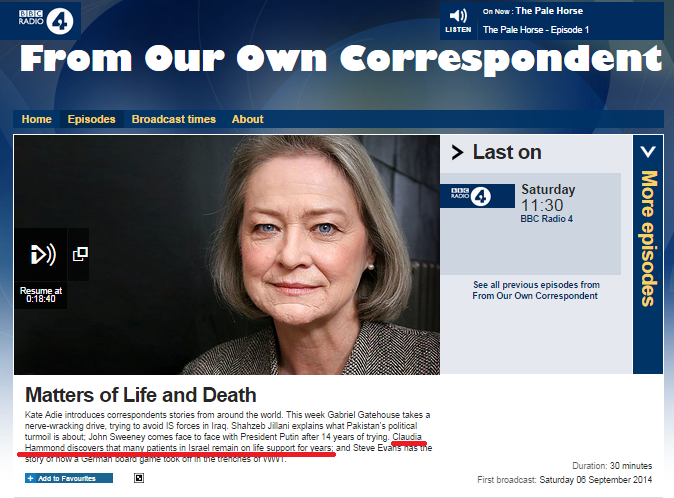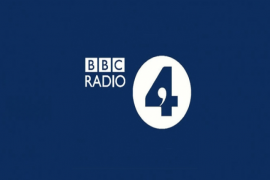The September 6th edition of BBC Radio 4’s ‘From Our Own Correspondent’ was titled “Matters of Life and Death” and included an item by Claudia Hammond, described in the synopsis as follows:
“Claudia Hammond discovers that many patients in Israel remain on life support for years”.
The programme is available here, with the relevant segment beginning at 18:10, or here as a podcast under the different title “The Silent Wards”.
The item is introduced by programme presenter Kate Adie thus:
“The news from Israel has been dominated recently by events in and around Gaza. On this programme though, we like to give ourselves the space to examine other aspects of life and death. In January this year a former Israeli prime minister Ariel Sharon died after eight years in a coma following a massive stroke. In many other countries the machines keeping him alive would have been turned off earlier. Jewish law forbids people ending a human life. As Claudia Hammond discovered in Jerusalem, the result is that large numbers of hospital patients spend years on life support.”
Hammond’s item is mostly devoted to the telling of individual stories, with the background she provides to listeners limited to the following segment:
“In most countries a ward like this would not exist and doctors and families in discussion together might have made the decision to turn off Hava’s husband’s ventilator to allow him to die. But since 2005 this has been illegal in Israel and is considered to be killing the patient, even if they’re already dying. The law in Israel was informed by Jewish tradition. But talking to families of other faiths in the hospital here, it seems to have become a cultural viewpoint too.”
Let’s take a look at the accuracy of some of those statements.
Kate Adie claims that “large numbers of hospital patients spend years on life support” but listeners are not told how many people “large numbers” actually are. In January 2011, for example, there were 787 people on life support in hospitals throughout Israel but by no means all would have been long-term chronic patients as that number includes, for example, premature babies and people in ICUs as the result of an accident or an illness. Israel’s population at the time was 7.7 million people: in other words, Adie’s “large numbers” are a few hundred people out of millions.
Adie states that “Jewish law” is the factor responsible for the “large numbers” of patients on life support. In fact Israeli state law is of course a separate issue from Jewish law, which is itself open to many different interpretations and by no means as simple and straightforward as Adie suggests.
According to Hammond, “the law in Israel was informed by Jewish tradition”. In fact the relevant law was the product of years of discussion by a public committee – the Steinberg Committee – appointed in the year 2000 by the Minister of Health. Members of that committee included, for example, Mr Ziad Abu Moch – Director of the College for the Study of Shari’a and Islamic Sciences in Baka al Gharbiya; Father Dr George Khouri – theologist and psychologist, President of the Greek-Catholic Court in Haifa and Sheikh Professor Fadel Mansour – member of the management committee of the Higher Druze Religious Council in Ussafiya and a biologist at the Vulcani Centre. Other members of the committee included experts in civil law, Jewish religious law, ethics, philosophy and medicine.
As we see, Hammond’s claim that the law “was informed by Jewish tradition” is a very partial and selective representation of the facts.
The law itself (a translation can be seen here), although passed in December 2005 actually came into effect in December 2006. Its wording is in fact considerably more nuanced than this BBC report suggests and it provides the opportunity for the patient to define in advance what sort of treatment he or she wishes to receive – or not receive – by means of signed advance directives. Hammond’s claim that “since 2005 this [turning off a ventilator] has been illegal in Israel” is both overly simplistic and inaccurate. Article C, clause 16 (a) for example states:
“Where an incompetent terminally ill patient is suffering significantly, and in respect of whom it has been determined pursuant to the provisions of section 5(b) that he does not want his life prolonged, medical treatment relating to his incurable conditions should be withheld from him, including tests, operations, resuscitation, ventilation, chemotherapy, radiation or dialysis, all in accordance with his wish as ascertained pursuant to section 5(b).”
In addition to its misrepresentation of the law itself, this BBC report clearly sets out to present an inaccurate view of an Israeli law as being synonymous with and defined by Jewish religious law. The political motivation behind that deliberate misrepresentation is all too apparent.
Update:
A written version of this report by Claudia Hammond appeared in the ‘Features & Analysis’ sections of the BBC News website’s Middle East and Health pages on September 14th under the title “Suspended between life and death“. Unfortunately the inaccuracies evident in the audio version were not addressed before the written version was published. Moreover, they seem likely to be further amplified on BBC World Service radio in the near future.




